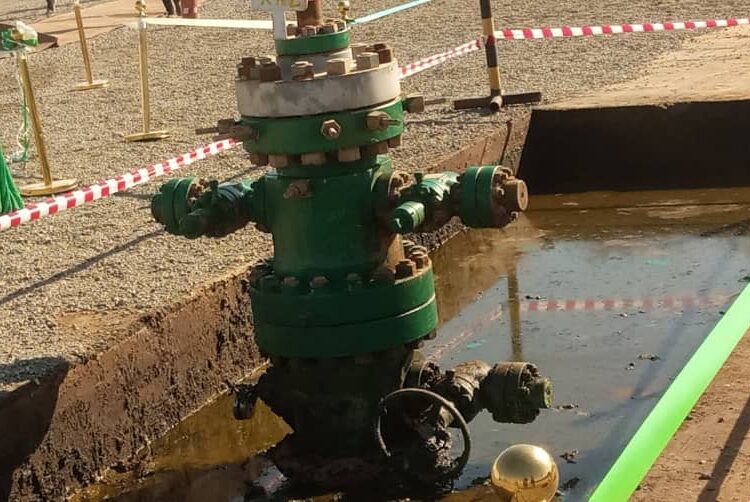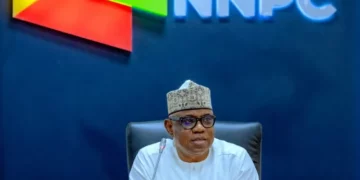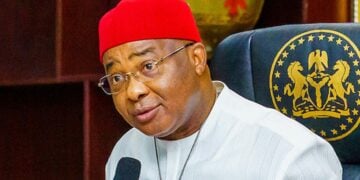Anger is building up in the North over the suspension of oil exploration activities in some states in the region.
The most pronounced cases are at the Kolmani oil field in the Bauchi-Gombe trough and Ebenyi-A Well in Obi local government area of Nasarawa State.
The situation is not different in the Bida Basin of Niger State where hydrocarbons and gas were discovered in commercial quantity.
A partnership between Ibrahim Babangida University (IBBU), Lapai, and the Nigerian National Petroleum Company Limited (NNPCL) to scale up exploration did not go beyond the drawing board level.
Stakeholders in Bauchi, Gombe and Nasarawa states told LEADERSHIP Sunday they were shocked by the NNPCL’s apparent loss of interest in developing the oil fields after drilling had commenced.
In November 2022, in the twilight of former President Muhammadu Buhari’s administration, the NNPCL, in partnership with the New Nigeria Development Company (NNDC), started drilling crude oil from two blocks in Kolmani Oil Filed, OPL809 and OPL810.
The oil field, traversing Bauchi and Gombe states, was projected to contain huge crude oil and gas deposits. Estimates showed about a billion barrels of crude oil and about 500 billion cubic feet of gas deposits.
It was projected that the Kolmani oil field could generate about $3 billion in investments for the country, including a petrochemical refinery of about 120,000 bpd, a gas processing plant of about 500 million cubic metres per day, a fertiliser blending plant, and a 300 megawatt power plant.
Apart from the financial prospect, the field has the potential to redraw the country’s hydrocarbon map and provide employment opportunities for Nigerians.
Drilling and exploration on the field was expected to last up to Year 2060. Kolmani oil blocks were projected to generate about 50,000 barrels daily.
However, concerns started mounting when the NNPCL and its partners started moving equipment out of the project sites in Bauchi and Gombe.
Initial reports indicated that the equipment were moved to oil fields in Nasarawa and the Lake Chad region.
But LEADERSHIP Sunday gathered that drilling activities at Ebenyi-A Well by NNPCL have been suspended and the equipment abandoned at the project site.
According to residents of the area, NNPCL only operated for three months at the Nasarawa well and left the site seven months ago.
The development is causing anxiety in the affected community, the local government area and region at large.
The Ebenyi-A well was spudded in February 2023. In March, Buhari performed the flagoff ceremony, signalling the commencement of full exploration in the Middle Benue Trough.
In a swift reaction, NNPC chief corporate communications officer, Olufemi Soneye, said the allegations were false.
Soneye said on the contrary, NNPC Limited has not suspended its oil and gas exploration activities in the inland basins. Instead the company is intensifying efforts to expedite the process and ensure the efficient exploitation of hydrocarbon resources in these areas, thereby contributing to national energy security.
“It is completely false that NNPC has abandoned the search for oil in northern Nigeria. On the contrary, we are making daily progress with significant success. NNPC Limited is actively engaged in exploration activities across Nigeria’s inland basins, with the following ongoing drilling projects,” Soneye said.
Giving a status report on the oil exploration activities in the region, he said that in Wadi-2 Appraisal/Exploratory Well in OPL 732: Located in Borno State within the Chad Basin, this well was spudded on November 4, 2023, and drilled to a total depth of 12,050 feet. The drilling phase concluded on June 29, 2024. Preliminary results from the geological evaluation of the well led to post-drilling well testing, which began on July 4, 2024, and is currently ongoing. This testing aims to further assess the target reservoirs for the presence of commercially viable hydrocarbon deposits and to gather data for future field development.
A sister publication, LEADERSHIP, had reported a hiccup in drilling activities at the site due to the complex geology of the area.
“The surface and immediate sub-surface geology of the Obi area is made up of very thick dark shales and coals of the Awgu Formation. Beneath this Awgu Formation is another very thick shale of the Ezeaku Formation.
“Drilling through these thick units of shales (clays) is not an easy task in any drilling campaign. I believe the NNPC had anticipated that from seismic and geological sections, but I am not sure they knew it would be so herculean and overwhelming,” an expert close to the exploration activities told our correspondent.
It was learnt that the anomaly affected the drilling rigs and other equipment several times before progress could reach 1,500 metres.
Stakeholders Seek Northern Governors’ Intervention
On the Kolmani oil fields, Nuhu Obaje, the NNPC chair professor and coordinating director of Research and Development at the Ibrahim Badamasi Babangida University, Lapai, said it is unfortunate that activities have ceased despite the immense progress made at the sites.
He said NNPCL, working with Shell’s preliminary data, made a classical discovery in the Kolmani River-2 well in 2018.
“This well has been appraised and developed with Kolmani River-3 and Kolmani River-4 wells drilled in Bauchi and Gombe States, only awaiting production.
“The plans to develop the field further and commence production were hinged on establishing cement and fertiliser factories and a mini-refinery near the Kolmani River Field. Of course, moving the oil to the Atlantic coast would not be easy, where our export facilities are hosted.
“Agreements were signed with some independent producers but everything has now returned to silence,” he said.
He opined that the frontier basins, which comprise the Anambra, Benue, Bida, Chad, Dahomey, and Sokoto Basins, have 80 percent of the surface area and subsurface stratigraphies in the northern sector of Nigeria.
He said that despite the advantage, it was clear from the beginning of the current administration that the political will to continue exploring the inland basins was lacking.
“With the appointment of the two petroleum ministers from the Niger Delta region, it was clear that Nigeria has returned to being fixated on the Niger Delta despite the enormous potential in the other sedimentary basins outside the Niger Delta.
“This is also easy to understand as we hear that many of our leaders and political actors have oil wells and other investments in the Niger Delta region but if we think corporate Nigeria and discard sectional sentiments, we will not overlook the huge resources in the Benue Trough and the other inland basins,” he stated.
Comrade Hashim Pali, coordinator of Pali Community Development Association, a forum for stakeholders in the host community in Bauch State, said that despite the project’s huge potential, the NNPCL had lost commitment to implementing the Kolmani oil project.
“We have held a series of engagements with relevant stakeholders in Bauchi State to see ways we can push for the realisation of the project. We have had robust discussions and made efforts.
“For instance, we engaged the senator representing Bauchi South, Senator Shehu Baba, on the project, and he assured us of his dogged commitment to see to the full actualisation of the project,” he said.
Pali said findings about the state of the project are pathetic after the formal inauguration in 2022.
“The NNPCL took equipment to Nasarawa and Lake Chad for similar projects which are not up to the stage of Kolmani,” he noted.
He explained that NNCPL GMD promised to continue drilling and exploration at the field three times but failed to keep to his words.
“Kyari claimed that a company had been engaged to continue developing the Kolmani oil field and was mobilized, but more than a year after these remarks, nothing was done on the site.
“It is high time Kyari put national interest in the way he is handling Kolmani oil exploration and also understand that the Kolmani oil project is not just an affair for Bauchi and Gombe; it’s a project for the northern region and the country at large. So, there should not be any issue that the Kolmani is not cited in Borno State. Both Bauchi and Borno are the same thing,” he said.
The Speaker of the Bauchi State House of Assembly, Abubakar Sulaiman, appealed to the northern governors to form a united front to ensure the actualisation of Kolmani oil exploration.
“It is unfortunate that the good expectations of the people regarding the project are gradually becoming blurry. The joy that flooded the hearts of most residents in the hope of wealth creation, employment opportunities and development in all sectors are turning to fairytales.
“The Bauchi State government has provided the enabling environment needed for full scale oil exploration while putting all items necessary to make the work successful.
“Governors of Bauchi and Gombe should, as a matter of urgency, collaborate with key stakeholders at the federal government level to resume crude oil exploration in Kolmani,” he said.
The Bauchi State commissioner for natural resources, Bello Maiwada, said the state government had been engaging with relevant stakeholders at the federal government level to expedite crude oil exploration in Kolmani.
“Issues relating to crude oil exploration are matters on the exclusive list of the federal government; as such, we don’t have much to say about them.
“However, as a state, we are stakeholders because we are the host community. Virtually, every move we will make will naturally be from this position,” he said.
Maiwada said while no significant progress has been made since former President Muhammadu Buhari commenced drilling at Kolmani, the Bauchi State Government has provided an enabling environment for full-scale crude oil exploration.
A resident of Kolmani who does not want his name published revealed that months ago, personnel from a firm, Sterling Global, were seen trying to fix the bridge which raised “our hope that exploration activities may soon continue.
“They have fixed the pillars of the bridge and, as I speak with you, a crane can be sighted working to lift the beams of the bridge,” he said.
Regarding security provisions, LEADERSHIP Sunday learnt that a team of personnel from the Nigeria Security and Civil Defence Corps (NSCDC) and Nigerian Army are protecting the area covering the Kolmani Oil Field.
The lawmaker representing Misau/Dambam constituency in the House of Representatives, Bappa Aliyu, said through implementation of Petroleum Industry Act (PIA), Kolmani oil field could be developed to streamline additional revenue to the country.
He said PIA empowered the NNPCL with the requisite legal framework to fully lead oil exploration in the country.
A traditional leader in Gombe State who does not want to be mentioned has this to say about the oil discovery at Kolmani: “The 10th of October 2019 will forever remain a turning point in the area of inland basin exploration and a great day to the people of northeast, the north, and Nigeria as a whole because it was the day NNPCL announced the discovery of oil after encountering hydrocarbon outflow to the wellhead while performing a well-test operation. It was a joyous and great day for us.”
In Niger State, sources hinted that IBB University may not be able to meet up with the financial requirements to conclude its research on the basin and that the partnership with NNPCL was not yielding the desired result.
Last week, the vice chancellor of IBBU, Professor Abu Kasim Adamu, said the complete slowdown of exploration in Bida Inland Basins was a setback in Nigeria’s quest to book additional reserves.
He made the assertion at the 2024 Earth Week, with the theme “Refresh and Restore the Earth: Growing a Greener Tomorrow, ” organised by the Nigerian Mining and Geosciences Society (NMGS)/Nigerian Association of Petroleum Explorationists (NAPE), IBB University Students Chapter.
Adamu, therefore, advocated for more commitment through expedited action in the commencement of drilling in the Bida Basin, noting that since seismic data and interpretation, as well as other exploration research results showed positive potential for oil and gas in the basin, more needed to be done by the critical stakeholders.
We’ve got the edge. Get real-time reports, breaking scoops, and exclusive angles delivered straight to your phone. Don’t settle for stale news. Join LEADERSHIP NEWS on WhatsApp for 24/7 updates →
Join Our WhatsApp Channel










